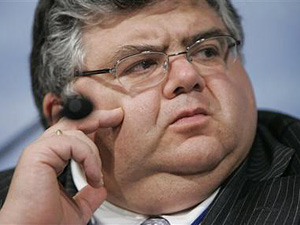
|  |  |  Editorials | Issues | January 2009 Editorials | Issues | January 2009  
Mexico Crisis Response Linked to US, Carstens Says
 Jens Erik Gould - Bloomberg Jens Erik Gould - Bloomberg
go to original


| | Mexican Finance Minister Agustin Carstens said growth in the fourth quarter of last year was “close to zero.” |  |
Mexican Finance Minister Agustin Carstens said the economy’s ability to mitigate the global financial crisis this year will depend largely on the U.S. stimulus plan and how quickly financial markets stabilize.

Mexico’s economy probably grew 1.7 percent last year with almost no expansion in the final quarter, Carstens said yesterday in an interview in Mexico City. The number of formal jobs may fall this year, though government plans to help companies avoid layoffs and boost infrastructure spending will save jobs, he said.

Mexico is weathering the worst financial crisis since the Great Depression better than the U.S., which buys 80 percent of Mexican exports, and coping more successfully than in past global slowdowns. Still, the government forecasts the economy will be harder hit than it previously predicted as the U.S. slump saps demand for exports, threatens jobs and slows remittances.

“The extent, speed and application of the program that will hopefully be approved in the U.S. is very important,” Carstens said of the $825 billion stimulus plan being debated by U.S. lawmakers. “In Mexico, interest rates have started to come down and that will be a factor that will support our economy.”

While Carstens, 50, declined to give an opinion on an optimal level for Mexico’s benchmark interest rate, he said the central bank probably has room to cut more because of falling commodity prices and a government plan to reduce energy costs. Policy makers reduced the rate for the first time in almost three years Jan. 16, cutting a half percentage point to 7.75 percent.

Space to Move

“I don’t want to give a personal position on the level of interest rates,” Carstens said. “But as we look at the year as a whole - as the central bank pointed out - it seems there will be space for further lowering our interest rates.”

The peso, which has weakened 29 percent against the U.S. dollar in the past six months, will probably stabilize, Carstens said.

“The peso will follow fundamentals and should keep its value as we go into the future,” Carstens said.

President Felipe Calderon is seeking to mitigate the impact of the worldwide economic slump with a stimulus plan that includes expanding infrastructure spending, freezing gasoline prices and helping companies avoid layoffs when they lower production levels. Mexican exporters will also benefit from the weaker peso, Carstens said.

Stimulus Package

The government may make minor adjustments or additions to the plan, Carstens said.

Carstens said growth in the fourth quarter of last year was “close to zero.” The government forecasts no growth this year. The central bank said today that the economy probably contracted 1 percent in last year’s fourth quarter and may shrink as much as 1.8 percent this year.

Petroleos Mexicanos, the state-owned oil company, provides about one-third of federal government revenue. Mexico hedged oil exports for 2009 at $70 per barrel to protect against a drop in prices. The value of the hedging may be $9.55 billion, Carstens said last month.

While the 2009 budget is set, the Finance Ministry is considering other sources of revenue for 2010 in case oil prices remain low, Carstens said, declining to say what those sources would be. Mexico’s stabilization funds will also provide a cushion for falling revenue, he said.

Violence

Carstens said net oil output probably won’t fall this year or between now and 2012. Pemex said last month that crude output fell 9.2 percent in 2008, the largest percentage decline since World War II, as production at its biggest field dropped.

A sharp escalation in drug-related violence hasn’t discouraged foreign companies from investing in Mexico because the government’s campaign to fight cartels has restored confidence, Carstens said. Calderon has sent thousands of troops to areas where traffickers are battling over drug routes.

Miguel Messmacher, the Finance Ministry’s chief economist, said Dec. 20 that the country will continue to lose 1 percentage point from its annual growth rate unless Mexico gets its organized crime violence under control. Drug-related deaths more than doubled last year to more than 5,000.

Before becoming finance minister, Carstens, who has a doctorate in economics from the University of Chicago, was the deputy managing director of the International Monetary Fund and the director of economic research for Mexico’s central bank.

To contact the reporter on this story: Jens Erik Gould in Mexico City at jgould9(at)bloomberg.net. |

 |
|  |



